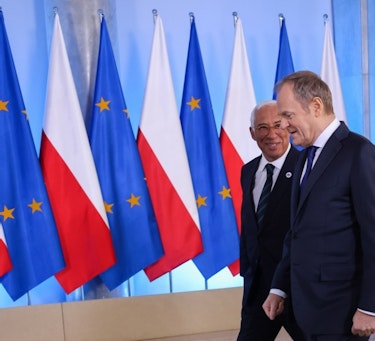Securing the Polish Moment: Strategies to Sustain Momentum

Over the last few years, Poland has gradually gained a greater role on the international security policy arena. As the country holds the EU Council Presidency from January to June 2025, its security policy takes center stage amid shifting geopolitical dynamics.
When “Law and Justice” was ousted from office in December 2023, the accumulated political capital of Poland’s new liberal ruling coalition, combined with Poland's economic condition and military standing, seemed to offer a beacon of hope amid an otherwise bleak geopolitical landscape in Europe. In the eyes of many, Poland is experiencing its moment in the spotlight. However, if the ruling coalition fails to implement structural economic reforms, continues to shift rightward in pursuit of conservative votes, and remains overly reliant on the U.S., this moment could quickly fade into the past.
Poland has been the greatest beneficiary of EU accession, with its GDP doubling between 2004 and 2022. The Polish EU Council Presidency presents a significant opportunity to influence EU policies on issues crucial to Poland, such as securing funding for defense and sustaining pressure on Russia. The European Commission's plans to offer loans to EU members for military purchases and to establish a unified defense market, signal a direction that aligns with Poland's long-held aspirations within the EU.
In a world of fluctuating geopolitical alliances, Poland has made significant strides in strengthening security and defense cooperation with like-minded countries, such as its Nordic-Baltic neighbors, the UK, France, and now also Germany. The country is also reinforcing the concept of a whole-of-society approach to defense, expanding its voluntary military training program. Poland continues to pursue boosting its military strength and self-sufficiency. As NATO’s top defense spender, Poland has consistently invested over 2% of its GDP in defense since Russia’s annexation of Crimea. However, around 70% of this spending is spent on imported armaments.
Investing in warfare unwisely, and at the expense of welfare and the environment, has long-term negative consequences. Approximately 85% of Poland’s energy still relies on fossil fuels, putting the country at risk of economic stagnation if it fails to quickly transition its energy mix and embrace decarbonization as a means to boost economic competitiveness. Moreover, as the country gears up for the presidential election in May 2025, Donald Tusk’s government has increasingly pursued anti-European policies, such as rejecting the EU Pact on Migration and Asylum, opposing the EU-Mercosur deal, and approving a bill that allows the government to suspend the right to claim asylum for those who cross the border irregularly.
Poland’s leadership has also been notably absent at a critical moment for Ukraine. The country could, for instance, earmark a portion of its planned 4.7% of GDP defense budget to support Ukraine’s military efforts. Finally, Poland was unprepared for the shifting dynamics of the transatlantic relationship and the U.S.-Russia reset, which has initiated unprecedented geopolitical changes and necessitates a re-evaluation of Poland’s security and defense policies.